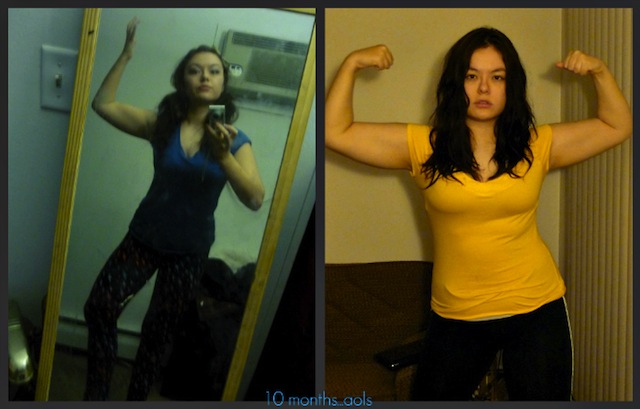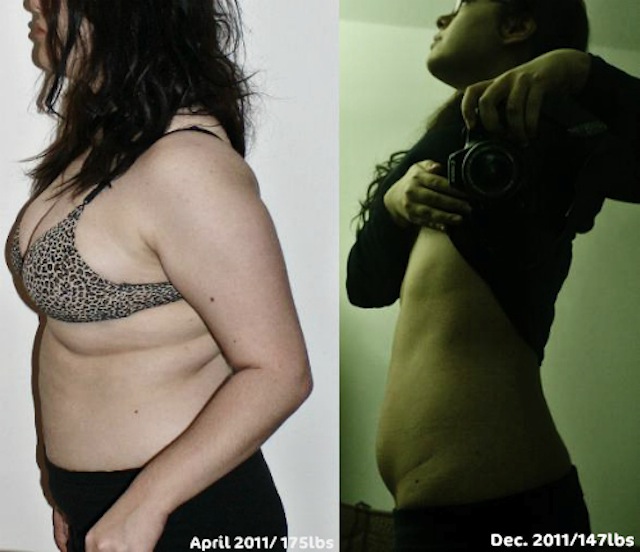This is a guest post from Ann Olson – The Wellness Chick.
As a kid, I loathed breakfast. I never felt hungry, hated breakfast food, and just didn’t like the sensation of food in my stomach before going to school. Still, my mother demanded I’d eat something–like a bit of toast–because she claimed it was good for me (she never explained why it was).
I’m in my mid 20s now, and I’ve gone months without eating breakfast. I’ve also lost over 40lbs and 10% body fat, and barely feel hungry. For years I struggled with healthy eating habits, but now I have been practicing my healthy lifestyle for nearly a year. I’ve even decided to become more active (my full-time career as a freelance writer just wasn’t very active), becoming a weightlifter and aspiring to complete in my first bodybuilding figure contest in 2013.
I also recently become active as a nutrition and fitness blogger on The Wellness Chick, passionate about spreading what I’ve learned to other people.

For someone who was clinically overweight just a year ago, that’s quite remarkable.
So what do I owe these benefits to? Well, I owe it to intermittent fasting, a method I originally discovered on Martin Berkhan’s blog, LeanGains.com. Most days I skip breakfast and wait until lunchtime to break my fast–and I’m rarely hungry. Skipping breakfast has also made it easier for me to adhere to my diet and nutrition plan, making me healthier in the process.
Crazy Myths About Intermittent Fasting
Since I’ve made the switch, I’ve had many people call my method “unhealthy” or potentially “metabolism-destroying.” One person even said it would make me store more fat because I wasn’t jump-starting my metabolism with breakfast.
Unfortunately, these accusations are nothing more than myths. Here are some myths that people have said to me about intermittent fasting:
Myth #1: “If you don’t eat breakfast you’ll slow down your metabolism.”
Truth: This myth arose as a result of studies which have identified breakfast skipping with dysregulated eating habits–essentially, bad eating habits that aren’t likely to support healthy, maintainable weight loss or management. One study showed people who skipped breakfast had a higher energy intake than those who did not, which, obviously, isn’t a great thing if you’re trying to lose weight. Unfortunately, dietitians have interpreted these findings as proof breakfast skipping slows down the metabolism, which simply was never proven.
So, if you’re freaking out that skipping breakfast will equal death for your metabolism, don’t. As long as you’re not overeating like the study participants did, you’re not going to magically gain weight.

Intermittent Fasting Just Works
Myth #2: “You’ll enter starvation mode and store more fat if you fast.”
Truth:As Troy mentioned in his previous post about intermittent fasting, you’re simply not going to enter “starvation mode” after 16 hours of fasting–that’s how long Martin recommends fasting. If fasting alone suddenly triggered starvation mode, we would all experience it.
To be technical, we all practice some form of fasting on a daily basis, usually when we sleep. For instance, if you sleep for 9 hours and then get up to eat breakfast, you’ve fasted for 9 hours–hence why it’s called “breakFAST.”
Furthermore, your metabolism won’t slow down until at least 60 hours into a fast, which is about 2 1/2 days. Monica Reinagel of Nutrition Diva also says the ballpark range is around three days, so unless you’re fasting for days on end, don’t worry about starvation mode–it ain’t happening.
Myth #3: “You’ll get too hungry and binge.”
Truth: In my opinion, the effects of intermittent fasting on your hunger are highly individual. People who always eat breakfast are obviously going to feel hungry if they suddenly skip breakfast, since their bodies are used to receiving food at that time period. Conversely, people who don’t eat breakfast simply don’t feel hungry, which is why they don’t eat right away (in most cases).
For me, it takes about 16 hours before I become hungry, so skipping breakfast doesn’t make me hungry. In fact, eating breakfast has the opposite effect–it makes me even more hungry throughout the day, causing me to overeat. So, no breakfast for me
What Intermittent Myths Have You Heard?
These are just some of the intermittent fasting myths I hear regularly. How about you? What claims have people made about why intermittent fasting isn’t good?
About the Author – Ann Olson is the founder of The Wellness Chick, a healthy nutrition, diet, and fitness blog fighting to promote moderation and mental wellness in a world of chaos. Follow her healthy wellness tips via Twitter, The Wellness Chick blog.




Want to discuss? Join the conversation CubeDwellerFitness's Facebook Page.